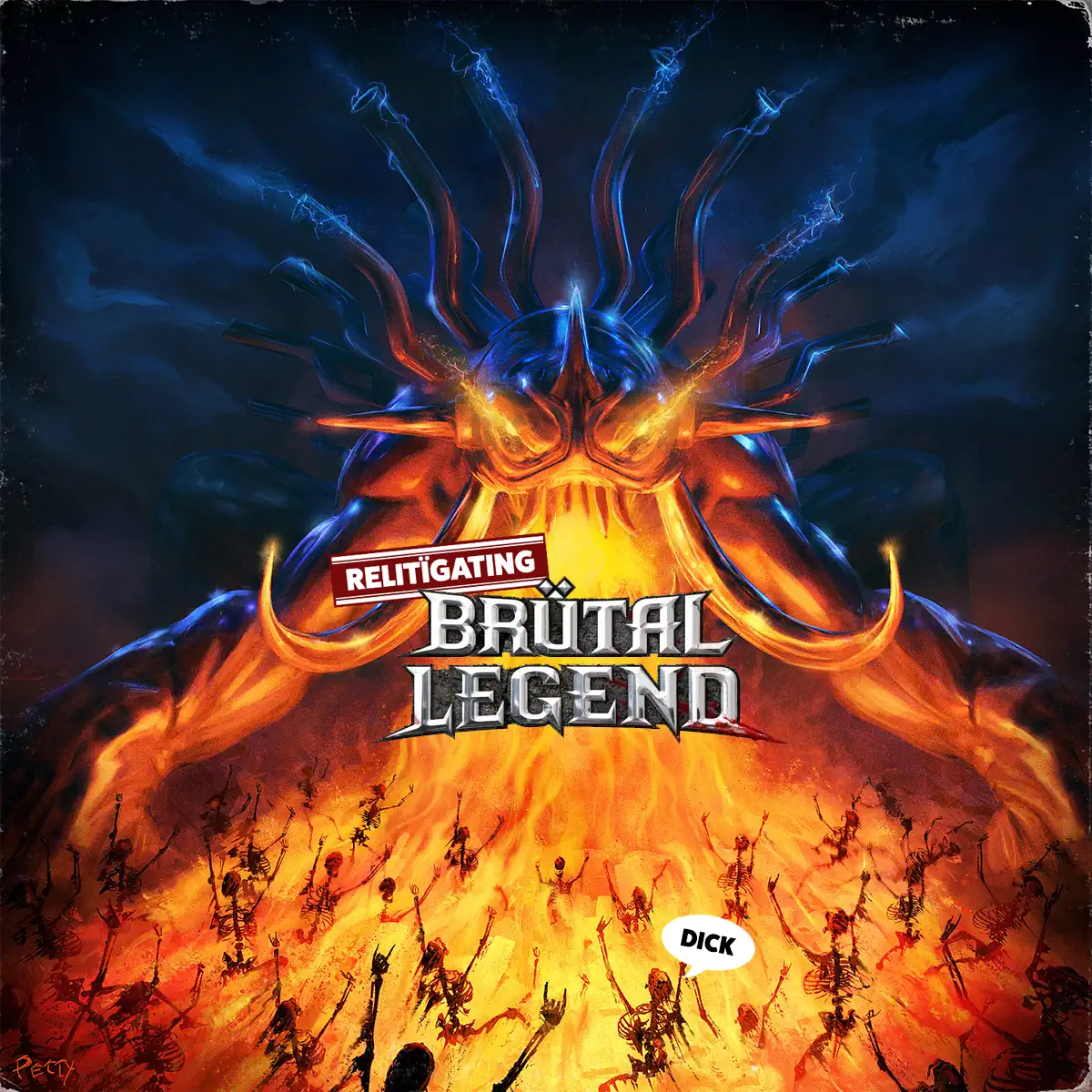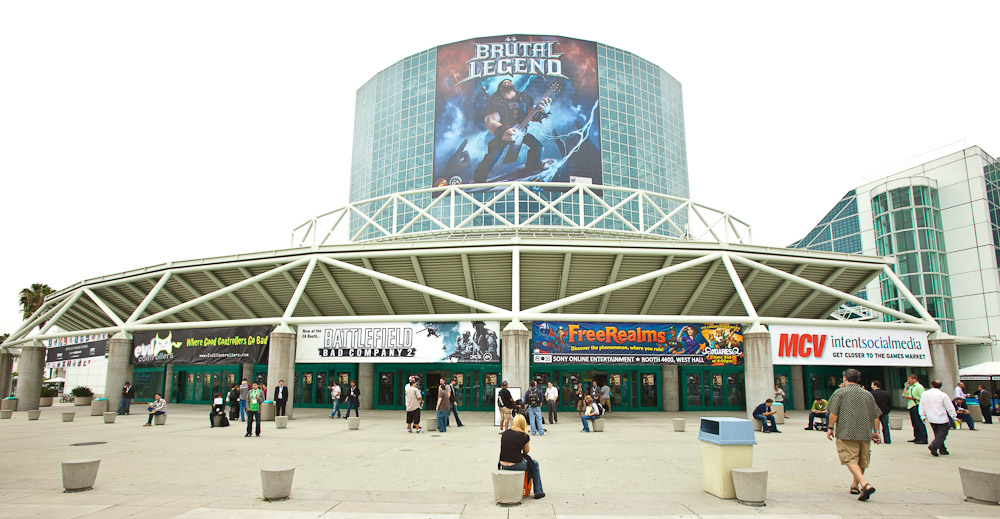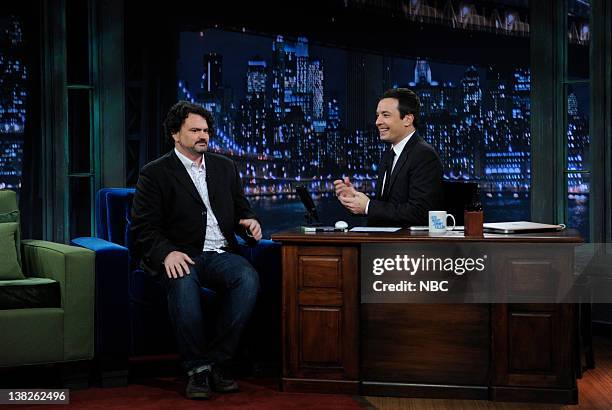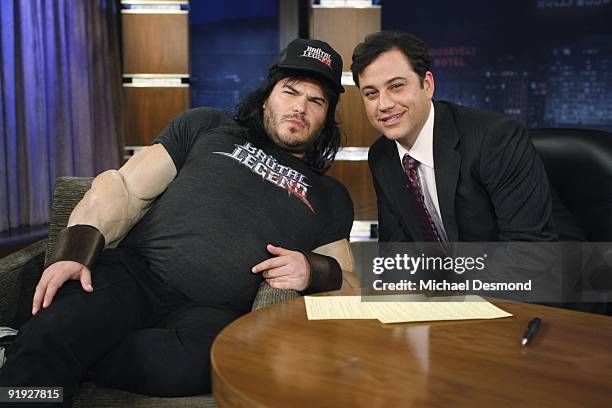Articles

Relitigating Brütal Legend Page Four
The lawsuit was ultimately settled within a few months under undisclosed terms, and the game barreled toward its “Rocktober 13th” launch with a marketing push that is surely the most aggressive that has ever marshaled behind a Double Fine game. The Army of Darkness flavor of over-the-top violence provided handy images to cut trailers around, and there were certainly ad-ready bullet points, like the 107 licensed songs that the EA legal folks were ultimately able to rack up. (Though if I may, the original score by go-to composter Peter McConnell is the real headline act.) Some high profile musicians even wound up part of the cast, with Ozzy Osbourne, Lita Ford and Rob Halford featured among the voice talent. Ronnie James Dio had recorded lines for the game’s villain Doviculus, but the character was in the end recast with the great Tim Curry.
Whatever voltage these names might have amped up the marketing machine with, the true figurehead of the campaign was an unbelievably game Jack Black, whose passion about the project extended well beyond any call of duty. He shot tons of promos, press conferences and guest appearances both as himself and in character as Eddie Riggs (in a comically fake muscle suit), including an appearance on Jimmy Kimmel Live! that ended with “Eddie” challenging a demon he insists he spots in the audience. By then a pretty well established, camera-ready personality in his own industry, Tim also participated heavily in the junket alongside Black or on his own, himself guesting on an episode of Late Night with Jimmy Fallon.
Looking back, it’s genuinely difficult to corral these many, many bits of taped marketing ephemera, a fair amount of which can indeed be found preserved on helpful YouTube channels, but some of which seems to be lost to the ages. It’s a little bone-chilling, actually, to realize how utterly some of this stuff has evaporated from the consciousness and the internet, when at the time it was downright overwhelming to keep up with. Though dollars were being spent as though it were a real possibility, I don’t know how much credence I give to the notion that Brütal Legend was Double Fine’s would-be blockbuster. Still, the game arguably had the most mainstream potential of any Double Fine project, and while profitability is another matter, it perhaps shouldn’t come as surprising that in a 2015 interview Tim confirmed it to be the studio’s best-selling title.

The performance of the game was a familiar story: modest sales relative to high expectations, but with a sizable following built over the long-term as new people could discover it free of baggage -- a gradual second wind once again aided by Double Fine’s downstream ability to sell the game on its own through the likes of Steam. (Unlike Psychonauts, the PC version was only developed well after the fact, in 2013.) For its first-run prospects, the choice to keep mum on the game’s RTS elements until very close to the release date inevitably had negative consequences. The phrase “bait and switch” was deployed often, and there was an ironic sense from a number of people that they experienced the RTS segments as an unscheduled distraction from the action/adventure they were enjoying, when the truth in terms of how the game was built was closer to the opposite. To this day, the misconception persists that the stage battles were the graft rather than the host.
And it was almost certainly a mistake for the game’s demo, which logic dictates be representative, to support this confusion by consisting of the game’s opening moments, which showcase only straightforward exploration, driving and hack ‘n slash gameplay. This vintage thread at the Quarter to Three forums is a decent capsule of the running commentary on the game’s broader appeal and the perceived tactical misdirection in its pitch to consumers. The litigating didn’t stop, in other words, with Activision.
It’s hard to say whether a more honest approach would have done the game favors commercially, as there’s no doubt that Brütal Legend’s gameplay has proven polarizing even among informed players, but it’s downright impossible to frame the approach of near-denial that was selected as a virtue. Tim came to see the problem more clearly in retrospect. Via Eurogamer:
Looking back at it, Schafer feels that this lack of communication with the audience was the single biggest thing that doomed the poor-selling, albeit critically acclaimed Brutal Legend, a hybrid RTS/action game that was marketed as an action-adventure.
"There was definitely a messaging problem with that game," explains Schafer. "That's one example of how the openness would have helped that game a lot. Say we were developing that and sharing our battle system with people before we launched; not only would people have known about it, but people would contribute ideas to it and embrace it, and feel like it was their idea instead of this nasty shock."
Schafer admits that he's not entirely blame free and that Vivendi, EA and Double Fine all took part in its notorious bait-and-switch.
"Vivendi was like 'No. Absolutely not. We'll never say RTS, ever. Even if someone asks us if it's an RTS we'll say no.'"
"EA mostly just didn't emphasise it," Schafer says. "They never told us not to talk about it. In fact, they did a whole press event at a bar in San Francisco that was all about the multiplayer. We released our multiplayer tutorial trailer before the game came out, so they weren't hiding it at all."
As far as Double Fine goes, it released a hugely misleading demo that focused on the game's driving and melee combat. This was entirely due to accessibility reasons regarding the game's steep learning curve. "The demo was kind of an accident," explains Schafer. "The mechanics ramp up slowly over time, so the demo is usually the first mission, so you just don't know those complicated RTS mechanics yet."
"The reason I went along with it is because it became something different. It started as an RTS, but it evolved over time and it really became different from an RTS game. Like I said after release, if you play it like an RTS game you won't win. You have to play it like this new RTS/action hybrid. So because it became something different I felt it was not correct to call it an RTS anymore."
Ultimately, Schafer regrets how the game was portrayed prior to release and thinks it could have been a much greater success.
"The part that I felt was most special about the game got unfairly vilified because of poor messaging," Schafer laments. "I think it's the neatest thing about the game turning into a big negative for people, whereas if we'd brought them in the process early they would have enjoyed those parts about the game a lot more."
"But I stand by it," he says, proudly. "I think it's still a lot of fun. People would play it online and they'd really enjoy it."
While time has conferred classic status to Psychonauts in a fairly unambiguous way, the legacy of Brütal Legend is more difficult to get a read on. Our own Thrik, webmaster of goddamned Brutal Legend.net for cripes sakes, laments that “the game sadly didn’t hold up so well,” and I glean that such mixed feelings are far from unique. Yet the game’s fan base is alive and growing, and Tim remains happy to humble their self-worth by logging on for online battle every Rocktober 13th. Clearly, I’ve taken as my subject a game that has endured. Not to throw stones, but maybe some of the more skeptical members of the Mojo staff should protect their delicate sensibilities by sticking with the Kabbage Boy concerts. As for me? Maybe I’m an easy lay for this stuff, but if the game had been nothing more than its menu, its legendary status would still be assured in my book:
Actually, assessing a game’s legacy like there’s some objective conclusion to be drawn feels a bit hifalutin and goofy to me, and it is at any rate a developing story. The game’s place in the history of Double Fine is closer to a matter of record, and more interesting to consider. After shipping Brütal Legend, its second title nearly a decade since its founding, the studio underwent a major pivot. When an allegedly greenlit Brütal Legend 2 (to which Tim planned to restore material that had to be cut from the original to make its release date, including an entire faction) was cancelled by EA, the studio once again found itself in an existential crisis. Though they had produced two extraordinary games, they could not be said to have hit upon a sustainable business formula.
Out of this uncertainty, and with the dangers of placing all their eggs in one basket being demonstrated more than once, Double Fine conceived their Amnesia Fortnight tradition and set upon a path of pitching out smaller games to be developed concurrently, a shift which the growing viability of digitally distributed games certainly had a hand in suggesting. Later, they dabbled in crowdfunding, most notably their seminal Kickstarter campaign for Tim’s graphic adventure comeback Broken Age, and eventually got another go-round at a colossal, publisher-backed, overscheduled opus after all in the form of Psychonauts 2. The ballad of Eddie Riggs resonated way beyond the business it did in 2009, throwing the studio into a dramatic, scary, but exciting metamorphosis that shaped Double Fine into a more self-reliant company that understood survival to be a matter of nimbleness, and which seemed to renaissance with the seasons.
There’s also just the legacy of Tim calling Bobby Kotick a dick. If anything has stood the test of time, it’s surely that.


